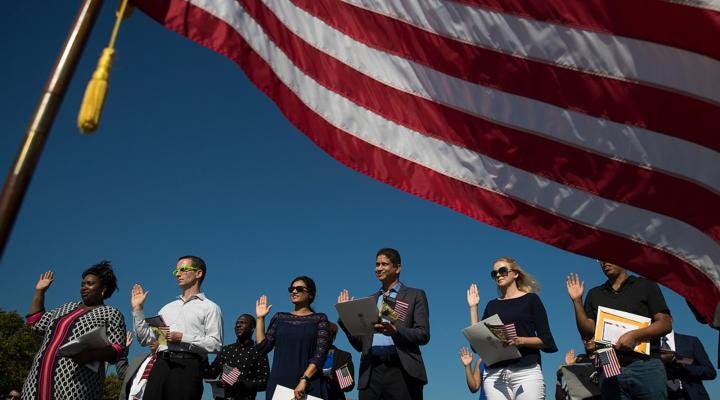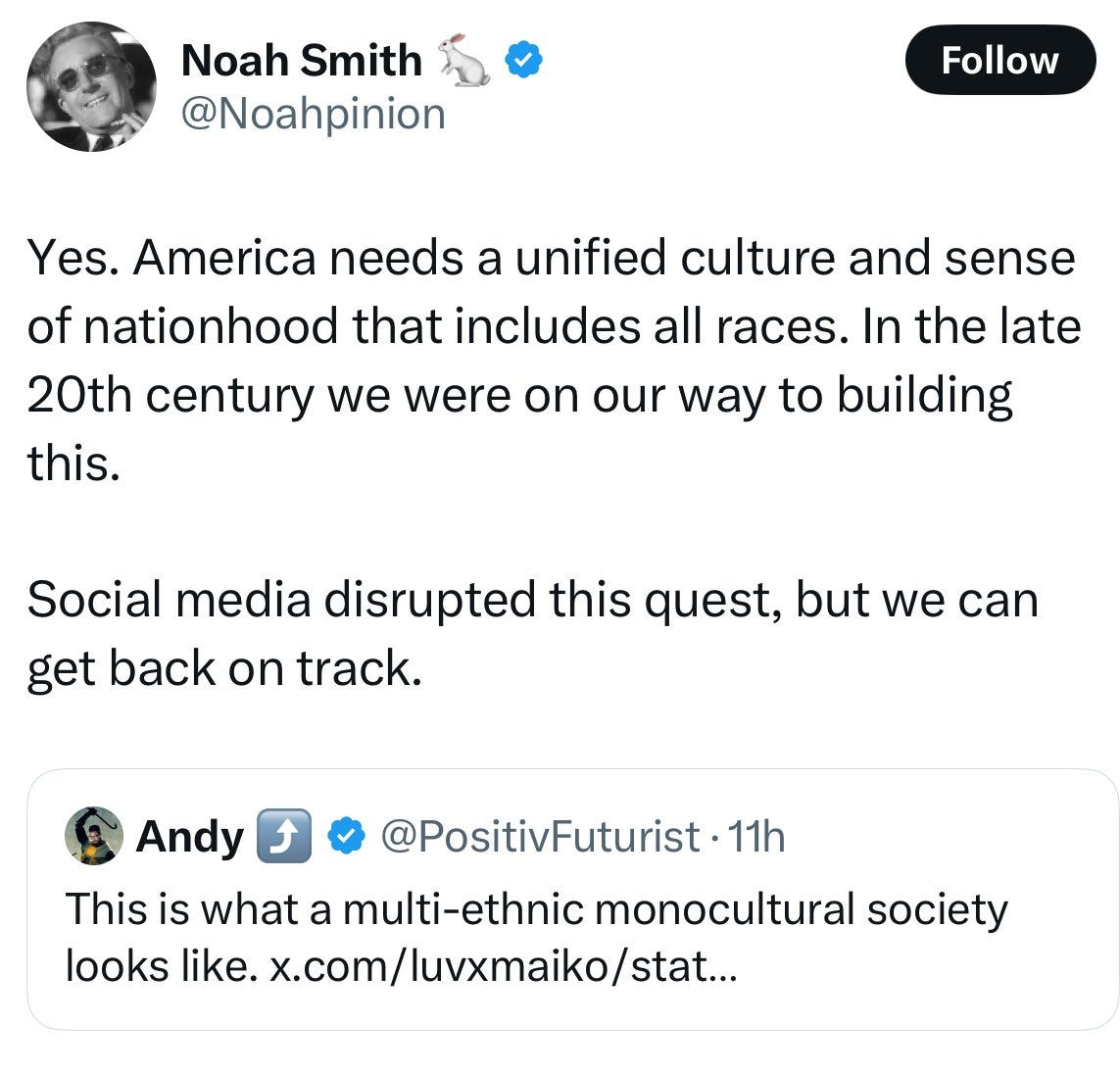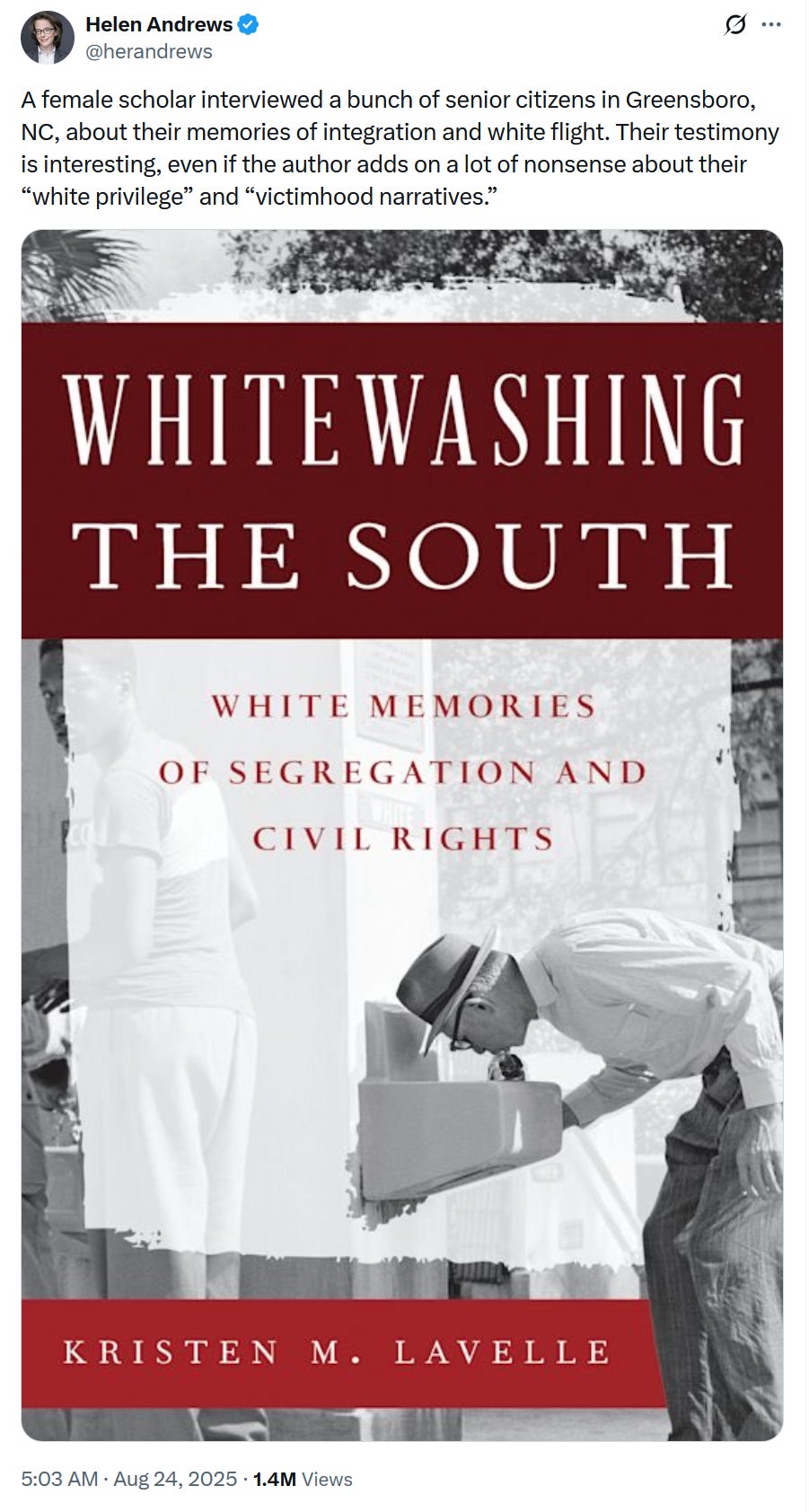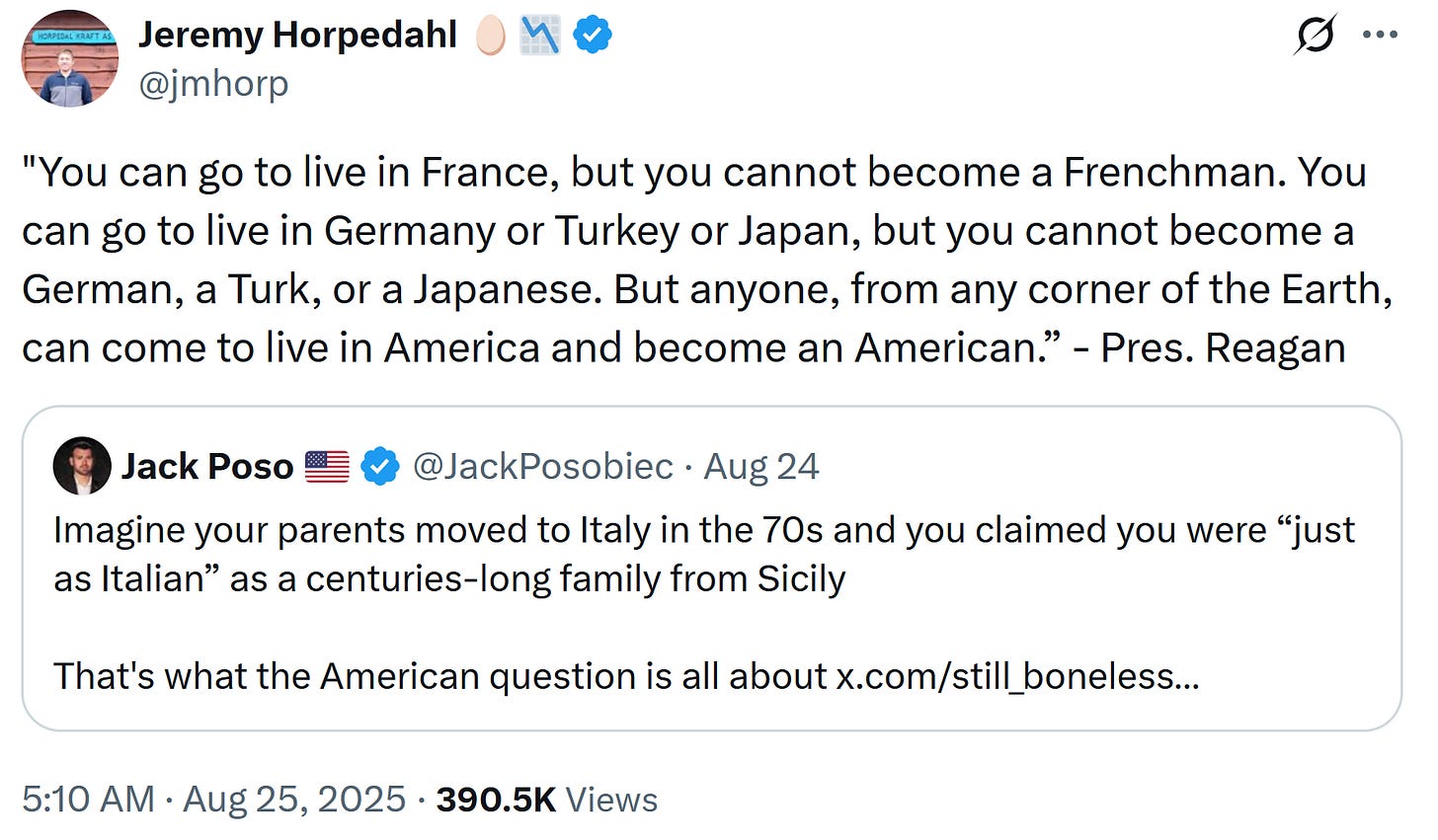Can Nationalism Be Constructed?
The implication for the U.S. is that we, too, can become a nation through the state’s designs.
The Latin American nations are one of the most interesting case studies in nationalism.
No real ethnic, linguistic, or religious difference between them.
But they formed, solidified, became “real” to their citizens, and show no sign of merging or dissolving.
And:
Latin American patriotism is the strongest refutation of the myth that “States” must arise from a pre-existing “Nation.”
In many cases, the reality is precisely the opposite.
The State is formed, and in time this *creates* a People, a national identity.
The funny thing is, I cite Adam Van Buskirk a lot, despite the fact we’d probably disagree more than agree. It’s just that we actually do agree on some of the more important things - such as the robustness of so-called “complex systems” and the world order - and he has very intriguing, well-formulated, well-informed takes, so he’s at least worth engaging. This is a provocative thesis of his and I want to share my thoughts on where I think he’s right and where I think he’s wrong.
Van Buskirk isn’t fundamentally wrong: nations are, to a large degree, constructs. They may be rooted in something real - ethnicity, language, religion - but what actually forms them is something else. That something else is usually a body of power. That’s usually the state.
Nations can also often arise not just from a shared identity, but a shared experience. Wars have a tendency to form nations - people who fight together and prevail end up staying together. Not always, but it’s often the case.
That said, I think Van Buskirk overstates it in saying “the reality is precisely the opposite.” It’s one thing to say that national identities can be formed out of disparate groups of people. It’s another to suggest that a national identity didn’t exist until a state created them.
Take the United States. Until the 13 colonies declared independence, the identity of “American” didn’t exist. However, this doesn’t mean some kind of nation didn’t exist pre-1776, either. It just wasn’t called “American.” Maybe “colonial.” But a distinct group of people capable of establishing nationhood certainly existed, maybe as early as the late 18th century. While a state, in theory, could establish a nation out of thin air, this isn’t likely to occur in practice. The peoples out of whom you establish a nation are going to have some sort of pre-political collective identity of their own, even if those identities are disparate and varied. The extent to which you can build something entirely new out of them is limited.
Though I think he’s doing so unknowingly, Van Buskirk seems to be conflating “nation” with “state” as well. I’m sure he understands that that the two are related, yet separate concepts. Both can exist independent of themselves; the U.S. isn’t a nation state, it’s a federation. It’s a loaded statement of fact with all sorts of big-time implications, but we’ll save those for another time. The point is that a state can exist without a single unified nation. Likewise, a nation can exist without a state. It’s how “stateless” people are a thing. In many cases, what we often call a “nationhood” isn’t really so. It’s more statehood. When Americans celebrate Independence Day, they’re not celebrating a nation, but instead a state. Once upon a time, that state may have been tied to a people, but no longer.
Finally, it must be mentioned that for Latin America, their language is, in many ways, their identity. Spanish is widely spoken, but not worldwide. Both Chinese and Hindi have more speakers. The point is that Spanish is, in many ways, a regional language, not a global one. Outside Latin America, only in Spain is it the dominant language.
Just as important, contrary to something Van Buskirk would say later, Latin American countries do have a super-majority ethnic group unique to those countries - the Mestizo. Whether the Mestizo constitute a nation or not, whether the states of Latin America are congruent with the Mestizo, it’s all besides the point. Eventually, all states comes to represent a certain ethnic group or bloc, one more than the other. This is because nations, even when constructed, are ultimately centered around an ethnos.
Go back to the U.S. This country never underwent ethnogenesis, which is why American nationhood seems perpetually stillborn. But one group that did undergo ethnogenesis were Blacks. They’ve always existed to a large degree distinct from the rest of American society, for well and ill, and are the one group who possess an identity completely its own. Is it any wonder that our state and national identity have increasingly come to be centered around Blacks in America? It used to be centered on Whites of Anglo-Saxon, then a more general European, heritage. As America tried to move past its White supremacist history, it needed a new identity. It tried a universalist identity, which still prevails for the most part. But now, if there’s any one figure our state identifies as “most” American, it’s the Black American. It certainly can’t be a White person.
Particulars aside, I think Van Buskirk is mostly correct: nations can be constructed. He’s also correct that the peoples of Latin America are loyal first and foremost to their states, not to some pan-Hispanic or pan-Mestizo identity. That much he got right. It’s just that there are limits to this framework and that states still need a people with some form of collective identity to build a nation off of. It cannot be built entirely from scratch.
The implication for the U.S. is that we, too, can become a nation through the state’s designs. Even if America isn’t a nation state in a strict sense, one would be obtuse to claim no sense of collective identity exists at all. The fact we still celebrate Independence Day and support Team USA at international sporting events shows that Americans, if only on a very rudimentary level, do feel to be part of a greater whole.
However, it’s clearly a weak form of collective identity. Beyond the holidays and sporting events, it doesn’t exist at all. In Latin America, there’s no question you speak Spanish or you don’t belong. In the U.S., making English the official language was a highly divisive proposition. Latin American countries are nationalistic to a degree that’d make most Americans uncomfortable if it were emulated here. Some countries, like Mexico, are utterly chauvinistic in their nationalistic sentiment.
The divergence is explained by culture and history, all of it too much to go over right now. I’ll just say that Latin America has been mostly authoritarian throughout its history, while America hasn’t. It’s much easier to impose nationalism on a population over which you have strong control over than a populace which can say “no.”
It’s a loaded topic, one which we can discuss for hours. Personally, I doubt America will ever undergo the ethnogenesis, be it bottom-up or top-down, necessary to become a Latin America-caliber nation. I think the U.S. will collapse before that happens. Even Latin American countries aren’t nation states. I prefer to describe them as “states with a strong national identity.”
At the same time, I leave the door open to the outside chance that an ethnogenesis will occur. But it can only come from a war so devastating, it has equal opportunity to tear us apart as much as bring us together. Either that, it comes from a hard-handed state which beats the national identity into us, efforts not only likely to trigger years on end of internal conflict, but for which the pay-off won’t come until a generation or so later, if it ever does. For this reason, I don’t think the Latin American model of nationhood is anything to be inspired by.
Last word on this topic:
Even when liberals properly diagnose the illness, they provide the wrong treatment plan. Not only is social media absolutely not to blame for the failure of American nationhood, there’s no turning back the clock, either. The civic nationalism Noah Smith speaks of was never strong enough to hold, and once it was destroyed (quite deliberately, I might add), there’s no way to put it back together again. Civic nationalism is the nationalism of last resort, so once it fails, there’s nothing else to turn to. You can only start from scratch and I don’t think anyone’s ready for that. It’s certainly not something anyone’s going to choose to do.
Regardless, as a nationalist myself, I’d be happy if America could achieve the level of nationalism Latin American countries have managed to cultivate. It’s the one thing they do better than us. It’s just that we don’t really have a way to get from here to there.
The Insanity Of Living With Your Oppressor
Speaking of race, we’ll briefly broach this interesting thread from X:
Thank goodness for Helen Andrews reading the book on our behalf. I don’t know if I could stand reading all the extra commentary on “White privilege” and “victimhood narratives.” History is never objective, but if the stated purpose of history is to help people understand the past, there’s no need to denigrate voices from the past. There’s no harm, unless you’re trying to peddle a narrative, in letting them speak for themselves. Contextualizing is one thing. Editorializing is another.
Anyway, the book lends perspectives you’re unlikely to hear anywhere else. I’ve said many times; we’re past due for a more complete, more honest assessment of the Civil Rights era. In many ways, the Civil Rights era is the new American Revolution, when the country was reborn in a better form. As such, it’s about the only aspect of our history which remains sacred, meaning you’re not going to hear anything even remotely approaching a critical take of it anywhere in the public sphere.
The fact is, the the Civil Rights movement led to many changes which weren’t for the better, school integration being at the top of the list. It’s amazing to see that Southern society went from ruthlessly oppressed by Blacks to being run roughshod by them literally overnight, at least in school:
Most interviewees had children in school when busing came in. “Our son quit takin’ his lunch because they would steal his lunch or his lunch money, so he just didn’t eat.” “When my daughter went there . . . she was afraid to go to the bathroom, to the point that we had to take her to a urologist.” “He would have our son get down and lick his shoes and he would say, ‘Your people have slaved my people, now I’m gonna slave you.’”
Again, not a lot of years separated this from the days of Jim Crow. These are changes you’d see only in the wake of a revolution. I’m not sure Americans truly appreciate how quickly things transformed in a very short period of time, including in the South, a place known for its conservatism and desire to change only on its own terms.
This passage seemed to resonate with a lot of readers [bold mine]:
“We were in the car and our son said, ‘Those black kids can get by with anything and they are never punished’ … My husband pulled the car over and said, “Have you ever learned any history in school? ... Do you know anything about how blacks have been mistreated all their lives, and they kind of deserve to misbehave every once in a while’ … I never heard our kids complain again about that sort of thing.”
Once more, it’s shocking to see how quickly White Southerners went from going along with Jim Crow to accepting that Blacks were going to have their way, whether anyone liked it or not. In one sense, it’s admirable. In another sense, it’s troubling, to see that a people can be so willing to surrender everything, including their childrens’ safety, just so they won’t be judged negatively. By the way, this is exactly what’s happening today - nothing terrifies a White American more than to be called a racist.
“Because of what our children were experiencing, we have children that are very prejudiced, much more than I would say I ever was, much to my sorrow. And they as adults would say, ‘Mom, you had no idea what it was like.’ And that’s very hard for me, because I thought we were doing it for the right reasons.” The author adds: “Her sense of disappointment and sadness for her own children, decades later, is palpable.”
Basically, the children of whom I’m assuming are Greatest and Silent Generation parents, cohorts not exactly known for their progressive attitudes, ended up even more prejudiced because of what they endured as youth. Comparatively, Millennials and Zoomers are less prejudiced because they missed out on the ugly early years of integration, went to school with fewer Blacks, or never knew anything else, and just accept it as the way things are. Either way, Black violence, including interracial violence, hasn’t gotten much better. It makes you wonder when - or if - prejudice will return.
Reading all this, a question comes to mind: why? Why would anyone think this was a good idea? What sense does it make to have the oppressor and oppressed, if only formerly so, live and work with one another? It’s not what would be done if keeping things peaceful and orderly was a priority.
Anti-colonialist attitudes have the same problem:
Mad that a nation who spent hundreds of years colonising literally a quarter of the world, are now apoplectic that migrants want to live there
Again: why live with your oppressor? This is like a woman divorcing her abusive husband, but still going to live in his house, anyway. Either things really weren’t so bad or she wants to live off him without having any meaningful relationship. It makes no sense, no matter what the case may be.
As a separationist, I’ve already crossed the proverbial Rubicon. Most other Americans, even if they’re willing to re-consider the Civil Rights movement with more of an open mind, still operate off a premise that integration was worthwhile and is here to stay. It never crosses their minds that, in any other situation, do we never view integration as a solution for parties in conflict.
In Bosnia, segregation is effectively policy. Despite seemingly sharing public spaces, the different ethnic groups - Croats, Muslims, Serbs - lead separate lives. Here’s a video from 2018 describing the dynamic:
Liberals find it tragic. If you ask me, I say this: if this is what it takes to keep the peace, this is what it takes to keep the peace. Forcing people to live together rarely pays off in the long run. The problem is, you’ll never understand this so long as you’re an idealist. Younger generations with no memory of the 1990s Bosnian War view segregation as unnecessary, but as I quoted historian H.W. Brands in my last essay, wisdom comes with age.
Hopefully, that wisdom for younger generations in Bosnia won’t come through war.
“Can” Isn’t The Same As “Will”
Before closing it out, let’s return briefly to the topic of nationhood:
Jeremy’s suggestion, in quoting 40th president, is that the moment anyone steps foot in the U.S., they’re American, full stop, a pseudo-religious belief among liberals. The problem is, I don’t think President Reagan was going that far. Notice he uses the term can, not will. People can come to America and, one day, become American. It doesn’t mean they will, and it certainly doesn’t mean that Juan who just crossed the border illegally five minutes ago is just as American as someone who’s ancestral foundation in the U.S. goes back to the 18th century.
Here’s Leighton Woodhouse answering Jack Posobiec with the same sort of thinking:
America is exceptional precisely because we don’t classify our citizens this way. We were the nation that left that blood and soil shit behind.
Jack wants to drag us back into the un-American idiocy of the Old World.
Here’s the thing that even well-meaning liberals like Woodhouse don’t get: we can reject blood-and-soil nationalism while also rejecting the idea that anyone becomes an American just by showing up. I don’t get the sense Woodhouse is a “participation trophy” kind of guy. Why does that apply to nationhood?
In a further exchange on X, Woodhouse confirmed that someone who became a citizen today but is more proud to be Mexican than American is, in fact, as American as say someone whose family came here in the 17th century, built the country and fought in almost every major war. If this is what he believes, fine, but it only confirms that America is basically a global megacorporation and we’re all merely its employees. We can be fired, laid off, and replaced at any moment. Our identity is devoid of value.
Woodhouse, of course, claims citizenship still has value even under the America-as-a-megacorporation model. He’s wrong, but I wasn’t talking about citizenship - I’m talking about identity, which is about much more than an official document. I’m talking about the very essence of one’s being. If the identity of American can just be handed to someone as though it’s just a job, it can just as easily be taken away, and has no inherent value. National identities, even when constructed, are meant to be inseparable from the person. An identity so fungible it can be given so easily, not only can be taken away just as easily, it’s not a real identity at all.
Then again, that’s what the Left wanted, right? If what’s real cannot be denied, then you make it less real, less meaningful, and reduce it to nothingness. Then it doesn’t need to be destroyed - it just goes away on its own.
So much to talk about, never enough time. That’s alright, though, because it’s time for you to do some talking yourselves. What are your thoughts on anything discussed here? Can nationalism be state-constructed? What’s the prospect for such a model in the U.S.? What do you think about anything else talked about today?
Give your best takes in the comments section.
Max Remington writes about armed conflict and prepping. Follow him on Twitter at @AgentMax90.
If you liked this post from We're Not At the End, But You Can See It From Here, why not share? If you’re a first-time visitor, please consider subscribing!




From a Canadian perspective, American identity seems very strong. Certainly Americans are very vocal in their nationalism. I’ve also been to Latin America and the USA is obviously a far more successful society.
On the other hand, depression, anomie and the use of mind altering drugs all suggest something is broken in the American spirit. The Left’s racial obsession and immigration chip away at national identity.
Canada is an interesting case in that it was quite successful at nationalism and threw it away for multiculturalism. There were symbols of France, England, Ireland and Scotland on the original flag, the Red Ensign. Other European nationalities were integrated but to a certain extent second best.
Then Trudeau I went hard for multiculturalism and Trudeau II declared Canada a post-national state. Now Canada is under stress and Carney is trying to harken back to British symbols and heritage. We’ll see if it works.
That’s the problem with post-nationalism; it won’t be there for you in a crisis.